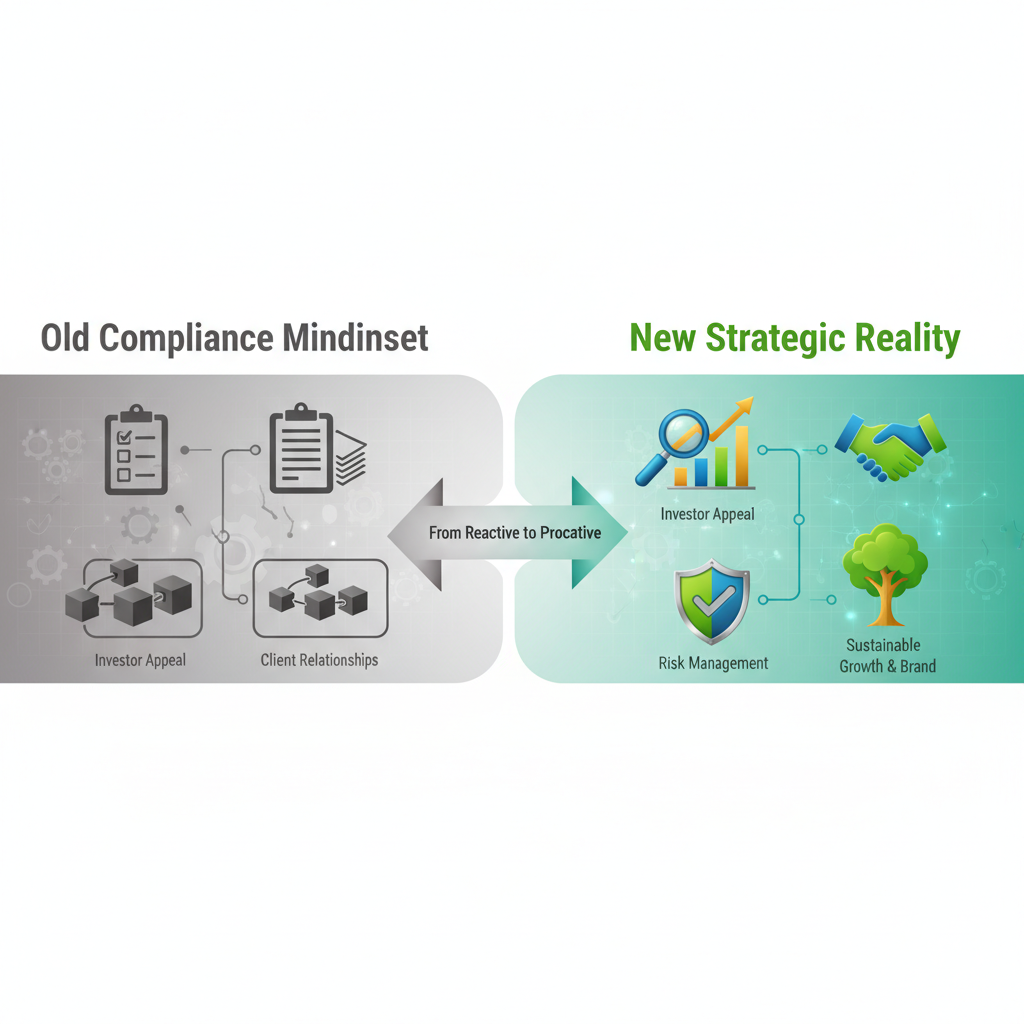ESG Reporting for Critical Infrastructure: Beyond Compliance to Competitive Advantage

ESG Reporting for Critical Infrastructure: Beyond Compliance to Competitive Advantage
Environmental, Social, and Governance reporting has transformed from voluntary disclosure to strategic imperative for critical infrastructure operators, yet many organisations continue to treat ESG reporting as compliance overhead rather than recognising its potential for creating competitive advantages and operational improvements. This perspective fundamentally misunderstands both the evolving ESG landscape and the opportunities it presents for forward-thinking organisations.
Through our partnership with ASafe Global and extensive experience across data centres, energy infrastructure, and industrial facilities, we have observed that organisations adopting strategic approaches to ESG reporting consistently achieve superior outcomes compared to those treating ESG requirements as regulatory burden. Effective ESG programmes create measurable business value whilst meeting stakeholder expectations and regulatory requirements.
The shift from compliance-focused to value-creating ESG programmes requires fundamental changes in how organisations approach data collection, performance measurement, and stakeholder communication. Organisations that recognise ESG reporting as strategic communication and operational improvement opportunity position themselves for sustainable competitive advantages in increasingly ESG-conscious markets.
The Strategic ESG Landscape
ESG considerations have evolved from peripheral concerns to central evaluation criteria for investors, clients, regulators, and communities. This transformation reflects growing recognition that environmental, social, and governance factors significantly affect long-term business performance and risk profiles.
Investor and Financial Market Expectations
Investment decisions increasingly incorporate ESG performance as fundamental risk and opportunity assessment criteria. Institutional investors, infrastructure funds, and project financiers routinely evaluate ESG performance when making allocation decisions, whilst rating agencies incorporate ESG factors into credit assessments and risk evaluations.
Access to capital and financing terms increasingly reflect ESG performance, with organisations demonstrating strong ESG credentials achieving more favourable financing conditions and broader investor interest. Conversely, organisations with weak ESG performance face higher borrowing costs and reduced access to capital markets.
Green bonds and sustainability-linked financing instruments provide opportunities for organisations with strong ESG credentials to access capital at preferential rates whilst supporting environmental and social objectives. These financing mechanisms require robust ESG reporting and verification to maintain market confidence and regulatory compliance.
Client and Market Differentiation
Corporate clients increasingly require ESG performance disclosure from critical infrastructure providers as part of their own sustainability reporting and stakeholder management requirements. Client organisations with ESG commitments seek suppliers and service providers that support rather than compromise their sustainability objectives.
Procurement processes increasingly incorporate ESG evaluation criteria alongside traditional cost and performance considerations. Organisations with superior ESG performance gain competitive advantages in client selection processes whilst those with weak ESG credentials face exclusion from major opportunities.
Brand differentiation through ESG leadership creates market positioning advantages that support premium pricing and client loyalty. ESG performance becomes particularly valuable in competitive markets where traditional differentiators provide limited sustainable advantages.
Regulatory and Policy Landscape
ESG reporting requirements continue expanding across jurisdictions with mandatory disclosure requirements, standardised reporting frameworks, and enforcement mechanisms. Regulatory compliance requires sophisticated data collection and reporting systems that address multiple frameworks simultaneously.
Climate change regulation increasingly affects critical infrastructure through carbon pricing, emissions reporting, and resilience planning requirements. These regulatory developments create both compliance obligations and opportunities for organisations prepared to address climate-related risks and opportunities proactively.
Social and governance regulations including diversity reporting, supply chain transparency, and stakeholder engagement requirements create additional compliance obligations whilst providing opportunities for organisations with strong social and governance practices.
Developing Strategic ESG Programmes
Effective ESG programmes require strategic approaches that integrate environmental, social, and governance considerations with business strategy and operational excellence. These programmes must balance stakeholder expectations with practical implementation constraints whilst identifying opportunities for competitive advantage creation.
Materiality Assessment and Priority Setting
ESG materiality assessment identifies environmental, social, and governance factors most relevant to business performance and stakeholder expectations. Effective materiality assessment considers both current significance and future trends that may affect stakeholder priorities and business implications.
Stakeholder mapping and engagement enables organisations to understand different stakeholder group priorities and expectations regarding ESG performance. Investors, clients, regulators, employees, and communities often have different ESG priorities that require balanced consideration in programme development.
Business impact analysis evaluates how different ESG factors affect operational performance, financial results, and competitive positioning. This analysis enables prioritisation of ESG initiatives based on potential business value creation rather than simply stakeholder pressure or regulatory compliance.
Performance Measurement and Target Setting
ESG performance measurement requires robust data collection systems that provide accurate, consistent, and verifiable information across multiple performance dimensions. Data quality becomes critical as ESG reporting faces increasing scrutiny from stakeholders and verification requirements.
Target setting must balance ambition with achievability to maintain stakeholder credibility whilst driving meaningful improvement. Science-based targets for environmental performance provide credible frameworks for climate-related commitments whilst social and governance targets require careful consideration of measurement methodologies and baseline conditions.
Benchmark analysis enables organisations to understand their ESG performance relative to industry peers and market expectations. Competitive benchmarking identifies areas where superior performance creates differentiation opportunities whilst highlighting areas requiring improvement to maintain market position.
Integration with Operations and Strategy
ESG programme integration with operational management ensures sustainability initiatives support rather than compete with operational objectives. Integrated approaches identify synergies between ESG performance improvement and operational efficiency enhancement.
Strategic planning integration ensures ESG considerations influence major business decisions including investment planning, technology selection, and market development activities. ESG integration prevents sustainability initiatives from becoming isolated activities with limited business impact.
Risk management integration addresses ESG-related risks alongside traditional operational and financial risks. Climate change, social licence, and governance risks increasingly affect business continuity and financial performance in ways that require systematic risk management approaches.
Environmental Performance and Reporting
Environmental performance represents the most developed area of ESG reporting with established measurement methodologies, industry benchmarks, and regulatory frameworks. However, effective environmental reporting requires sophisticated approaches that address multiple environmental impact categories whilst supporting operational improvement.
Carbon Management and Climate Reporting
Carbon footprint measurement must address both direct emissions from operations and indirect emissions from energy consumption and supply chain activities. Scope 1, 2, and 3 emissions reporting requires comprehensive data collection systems that capture emissions across entire value chains.
Climate risk assessment and disclosure requirements under frameworks such as Task Force on Climate-related Financial Disclosures demand scenario analysis and forward-looking risk evaluation. Climate risk reporting must address both physical risks from changing climate conditions and transition risks from policy and market changes.
Carbon reduction target setting increasingly requires science-based approaches that align with climate change mitigation requirements. Science-based targets provide credible frameworks for carbon reduction commitments whilst ensuring targets contribute meaningfully to global climate objectives.
Resource Efficiency and Circular Economy
Resource consumption reporting addresses water usage, waste generation, and material consumption across operations. Resource efficiency metrics provide insights into operational efficiency whilst supporting regulatory compliance and stakeholder expectations regarding resource stewardship.
Circular economy principles increasingly influence environmental reporting with emphasis on waste reduction, material recovery, and lifecycle thinking. Circular economy reporting requires tracking of material flows and waste streams throughout operations and supply chains.
Biodiversity and ecosystem impact assessment becomes increasingly important for critical infrastructure projects that affect land use and natural systems. Biodiversity reporting requires ecological expertise and monitoring systems that address both direct impacts and cumulative ecosystem effects.
Environmental Management System Integration
ISO 14001 environmental management systems provide frameworks for systematic environmental performance improvement and reporting. Integration of ESG reporting with environmental management systems ensures consistency between internal management processes and external reporting requirements.
Environmental compliance reporting must address regulatory requirements across multiple jurisdictions whilst providing insights into environmental management effectiveness. Compliance reporting systems must track performance against numerous regulatory standards whilst identifying trends and improvement opportunities.
Environmental investment and innovation reporting demonstrates commitment to environmental improvement whilst highlighting competitive advantages from environmental technology adoption. Innovation reporting provides opportunities to differentiate organisations through environmental leadership and technological capability.
Social Performance and Stakeholder Engagement
Social performance reporting addresses workforce management, community impact, and stakeholder relationships that affect both business performance and social licence to operate. Effective social reporting requires understanding of diverse stakeholder expectations and sophisticated measurement approaches.
Workforce Management and Development
Employee safety performance remains fundamental to social reporting for critical infrastructure operators where workplace safety directly affects both employee welfare and operational reliability. Safety reporting must address both leading and lagging indicators whilst demonstrating continuous improvement in safety culture and performance.
Diversity and inclusion reporting addresses workforce composition, advancement opportunities, and inclusive workplace practices. Diversity reporting requires sensitive handling of personal information whilst providing meaningful insights into organisational commitment to equality and inclusion.
Employee development and engagement reporting demonstrates investment in human capital whilst addressing stakeholder expectations regarding fair employment practices. Development reporting must balance individual privacy considerations with stakeholder expectations for transparency regarding workforce investment.
Community Impact and Social Licence
Community engagement reporting addresses stakeholder consultation, local economic impact, and social investment activities. Community reporting must demonstrate genuine stakeholder engagement whilst respecting community privacy and avoiding paternalistic approaches to community development.
Local economic impact assessment measures employment creation, local procurement, and economic multiplier effects from operations. Economic impact reporting provides evidence of positive community contribution whilst supporting stakeholder relationship management.
Social investment and community development reporting addresses voluntary contributions to community welfare and development. Social investment reporting must demonstrate strategic alignment with business objectives whilst avoiding perception of superficial community relations activities.
Supply Chain Social Responsibility
Supply chain labour practices reporting addresses working conditions, human rights, and fair employment practices throughout supply chains. Supply chain social reporting requires collaboration with suppliers whilst respecting commercial confidentiality and competitive considerations.
Modern slavery and human trafficking reporting requirements in many jurisdictions demand comprehensive supply chain oversight and transparency. Human rights reporting requires risk-based approaches that focus attention on highest-risk activities and supplier relationships.
Social procurement policies that prioritise diverse suppliers and social enterprises provide opportunities for positive social impact whilst supporting supplier diversity objectives. Social procurement reporting demonstrates commitment to inclusive economic development whilst supporting competitive supply chain management.
Governance Excellence and Transparency
Governance reporting addresses organisational structure, decision-making processes, and accountability mechanisms that affect both operational effectiveness and stakeholder confidence. Effective governance reporting demonstrates commitment to transparency and accountability whilst protecting commercial confidentiality.
Board Composition and Oversight
Board diversity and competency reporting addresses director qualifications, experience, and demographic diversity. Board reporting must balance transparency expectations with director privacy considerations whilst demonstrating appropriate governance oversight capability.
ESG governance integration demonstrates board-level commitment to sustainability whilst ensuring appropriate oversight of ESG programme implementation. ESG governance reporting must show genuine board engagement rather than superficial committee structures with limited authority or influence.
Risk management governance reporting addresses oversight mechanisms for ESG-related risks alongside traditional business risks. Risk governance reporting demonstrates systematic approaches to risk identification, assessment, and management across all business dimensions.
Ethics and Compliance Management
Code of conduct and ethics reporting demonstrates commitment to integrity whilst addressing stakeholder expectations regarding business conduct standards. Ethics reporting must balance transparency with employee privacy and commercial sensitivity considerations.
Compliance management system reporting addresses regulatory compliance across multiple jurisdictions and regulatory frameworks. Compliance reporting must demonstrate systematic approaches to regulatory management whilst avoiding disclosure of sensitive compliance issues that could create legal or competitive risks.
Whistleblower and grievance reporting addresses mechanisms for reporting concerns whilst protecting reporter confidentiality and ensuring appropriate investigation and resolution processes. Grievance reporting demonstrates commitment to accountability whilst respecting legal and privacy constraints.
Transparency and Stakeholder Communication
Stakeholder engagement processes and outcomes reporting demonstrates commitment to inclusive decision-making whilst providing accountability for stakeholder input consideration. Engagement reporting must balance transparency with stakeholder privacy and commercial confidentiality requirements.
Public policy engagement and advocacy reporting addresses political activities and policy positions whilst maintaining political neutrality and respecting diverse stakeholder perspectives. Policy reporting demonstrates transparency regarding public policy influence whilst avoiding inappropriate political involvement.
Executive compensation alignment with ESG performance demonstrates integration of sustainability considerations with management incentives. Compensation reporting must balance transparency expectations with competitive and privacy considerations whilst showing genuine performance linkage.
Technology and Data Management
Effective ESG reporting requires sophisticated data management systems that ensure accuracy, consistency, and verifiability of reported information. Technology systems must balance comprehensive data collection with practical usability and cost-effectiveness.
Data Collection and Quality Assurance
Automated data collection systems increasingly enable real-time ESG performance monitoring that supports both internal management and external reporting requirements. Automation reduces administrative burden whilst improving data accuracy and timeliness.
Data verification and quality assurance processes ensure ESG data meets increasing scrutiny from stakeholders and verification requirements. Quality assurance systems must address both data accuracy and methodology consistency to maintain stakeholder confidence in reported information.
Third-party verification requirements for ESG reporting create additional quality assurance obligations whilst providing stakeholder confidence in reported information. Verification processes must balance cost considerations with credibility requirements whilst ensuring practical implementation.
Integrated Reporting Systems
ESG data integration with operational and financial systems enables comprehensive performance reporting that addresses interdependencies between ESG performance and business outcomes. Integrated systems provide more meaningful insights than separate ESG tracking systems.
Reporting platform integration enables efficient production of multiple ESG reports addressing different stakeholder requirements and regulatory frameworks. Platform integration reduces administrative burden whilst ensuring consistency across different reporting requirements.
Performance dashboard development provides real-time visibility of ESG performance for management decision-making whilst supporting continuous improvement activities. Dashboard systems must balance comprehensive information with practical usability for different management levels.
Creating Competitive Advantage
Strategic ESG programmes create competitive advantages through operational improvement, stakeholder differentiation, and risk mitigation that support long-term business success. These advantages require systematic approaches to ESG programme development and implementation.
Operational Excellence Integration
ESG programme integration with operational excellence initiatives creates synergies that improve both sustainability and operational performance. Energy efficiency improvements, waste reduction, and safety enhancement often provide both ESG benefits and operational cost savings.
Innovation and technology adoption driven by ESG objectives often create competitive advantages through improved operational efficiency and capability development. ESG-driven innovation provides differentiation opportunities whilst supporting sustainability objectives.
Employee engagement and retention benefits from strong ESG performance support operational effectiveness through reduced turnover, improved productivity, and enhanced workplace culture. Social performance improvements create business value through human capital optimisation.
Market Position and Brand Development
ESG leadership creates market differentiation opportunities that support premium positioning and client loyalty. Brand development through ESG excellence provides sustainable competitive advantages that are difficult for competitors to replicate quickly.
Client relationship enhancement through ESG alignment supports long-term business development whilst creating barriers to competitive displacement. ESG-aligned client relationships often prove more resilient and profitable than traditional transactional relationships.
New market opportunities increasingly require strong ESG credentials for market entry and success. Green infrastructure, sustainable development, and ESG-focused investment provide growth opportunities for organisations with established ESG capabilities.
Risk Management and Resilience
ESG risk management integration addresses emerging risks that traditional risk management approaches may miss. Climate change, social licence, and governance risks increasingly affect business continuity and financial performance in ways that require systematic ESG risk management.
Regulatory compliance advantages from proactive ESG management reduce regulatory risk whilst positioning organisations favourably for evolving regulatory requirements. ESG leadership often provides advance preparation for regulatory changes that affect less prepared competitors.
Stakeholder relationship resilience from strong ESG performance provides protection against reputation risks and social licence challenges. Strong stakeholder relationships create business resilience that supports long-term success despite operational challenges or market difficulties.
The transformation of ESG reporting from compliance obligation to competitive advantage requires fundamental shifts in organisational approach and capability development. Organisations that embrace this transformation position themselves for sustainable success in increasingly ESG-conscious markets whilst those that resist change face growing competitive disadvantages.
Our experience through the AuditCo and ASafe Global partnership demonstrates that integrated approaches to ESG management deliver superior outcomes compared to fragmented compliance-focused activities. As ESG requirements continue evolving and stakeholder expectations increase, strategic ESG capabilities become essential rather than optional organisational competencies.
Success requires understanding that ESG reporting provides opportunities for operational improvement, stakeholder differentiation, and competitive advantage creation rather than simply regulatory compliance. Organisations that embrace comprehensive ESG programmes create sustainable value whilst meeting evolving stakeholder expectations and regulatory requirements.
For More Information Visit https://asafeglobal.com/ or contact info@auditco.com.au



